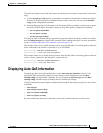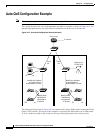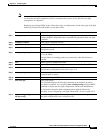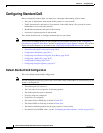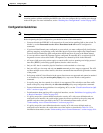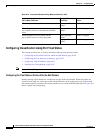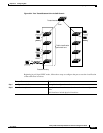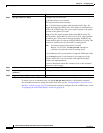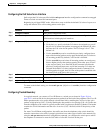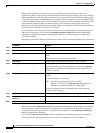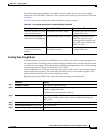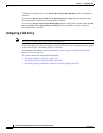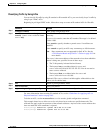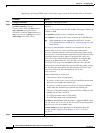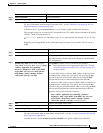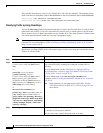
30-23
Catalyst 2950 and Catalyst 2955 Switch Software Configuration Guide
78-11380-10
Chapter 30 Configuring QoS
Configuring Standard QoS
Configuring the CoS Value for an Interface
QoS assigns the CoS value specified with the mls qos cos interface configuration command to untagged
frames received on trusted and untrusted ports.
Beginning in privileged EXEC mode, follow these steps to define the default CoS value of a port or to
assign the default CoS to all incoming packets on the port:
To return to the default setting, use the no mls qos cos {default-cos | override} interface configuration
command.
Configuring Trusted Boundary
In a typical network, you connect a Cisco IP Phone to a switch port as shown in Figure 30-4 on
page 30-21, and cascade devices that generate data packets from the back of the telephone. The Cisco IP
Phone guarantees the voice quality through a shared data link by marking the CoS level of the voice
packets as high priority (CoS = 5) and by marking the data packets as low priority (CoS = 0). Traffic sent
from the telephone to the switch is typically marked with a tag that uses the 802.1Q header. The header
contains the VLAN information and the class of service (CoS) 3-bit field, which is the priority of the
packet.
For most Cisco IP Phone configurations, the traffic sent from the telephone to the switch should be
trusted to ensure that voice traffic is properly prioritized over other types of traffic in the network. By
using the mls qos trust cos interface configuration command, you configure the switch port to which
the telephone is connected to trust the CoS labels of all traffic received on that port.
Command Purpose
Step 1
configure terminal Enter global configuration mode.
Step 2
interface interface-id Specify the interface to be trusted, and enter interface configuration mode.
Valid interfaces include physical interfaces.
Step 3
mls qos cos {default-cos | override} Configure the default CoS value for the port.
• For default-cos, specify a default CoS value to be assigned to a port. If
the port is CoS trusted and packets are untagged, the default CoS value
becomes the CoS value for the packet. The CoS range is 0 to 7. The
default is 0.
• Use the override keyword to override the previously configured trust
state of the incoming packets and to apply the default port CoS value to
all incoming packets. By default, CoS override is disabled.
Use the override keyword when all incoming packets on certain ports
deserve higher priority than packets entering from other ports. Even if
a port was previously set to trust DSCP, this command overrides the
previously configured trust state, and all the incoming CoS values are
assigned the default CoS value configured with this command. If an
incoming packet is tagged, the CoS value of the packet is modified with
the default CoS of the port at the egress port.
Step 4
end Return to privileged EXEC mode.
Step 5
show mls qos interface Verify your entries.
Step 6
copy running-config startup-config (Optional) Save your entries in the configuration file.



